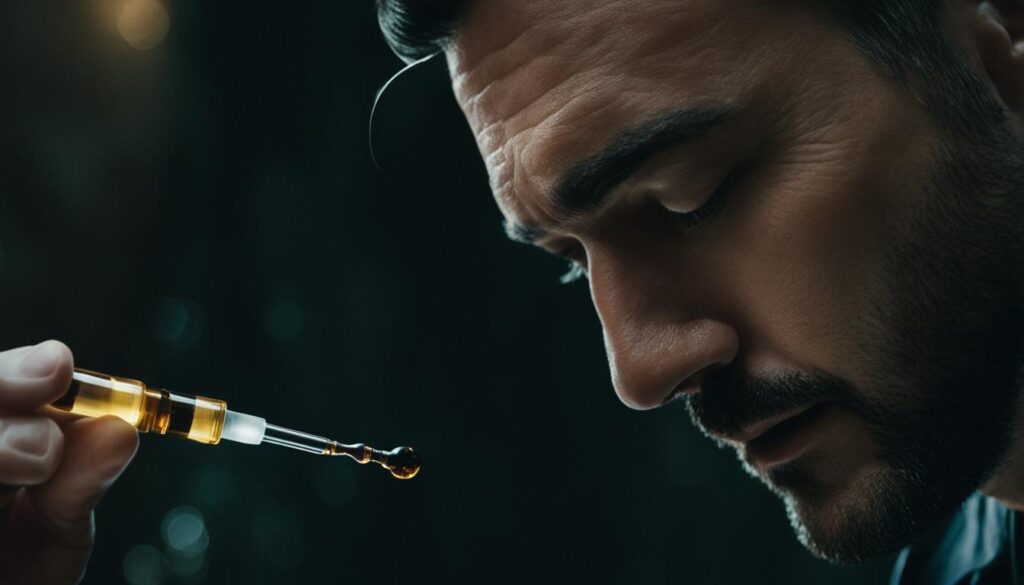Are you tired of dealing with dry, irritated eyes? Looking for a natural solution to improve your ocular health? Consider trying castor oil eye drops. These drops have gained popularity for their natural benefits, particularly in moisturizing dry eyes.
Castor oil contains properties that have been found to be anti-inflammatory and moisturizing. However, it’s important to note that castor oil eye drops are formulated with a low concentration and are part of solutions or emulsions, rather than undiluted castor oil from a bottle.
While castor oil eye drops can provide lubrication and help reduce mild dry eye symptoms, it’s essential to understand that they are not intended to replace professional medical care for serious eye conditions. Conditions like glaucoma, cataracts, and blurry vision require expert diagnosis and treatment.
Additionally, using unsterilized bottles to apply substances like castor oil around the eyes can put you at risk of allergic reactions and infections, which may even lead to permanent vision damage. Seeking professional help for accurate diagnosis, appropriate treatment, and the preservation of vision is crucial.
Key Takeaways:
- Castor oil eye drops are formulated with a low concentration and can provide relief for mild dry eye symptoms.
- These eye drops are not a substitute for professional medical care for serious eye conditions.
- Using unsterilized bottles or undiluted castor oil can pose risks of allergic reactions and infections.
- Seeking expert advice and proper treatment is essential for accurate diagnosis and the preservation of vision.
- Maintaining good eye health involves comprehensive eye exams, a healthy lifestyle, and following proper hygiene and care instructions.
The Versatility of Castor Oil and Its Potential Benefits for Eye Health
Castor oil, derived from castor beans, has been utilized in traditional medicine for centuries due to its diverse range of uses. Some individuals advocate for the efficacy of castor oil in reducing inflammation, improving lymphatic circulation, and promoting overall eye health.
Research has demonstrated that castor oil eye drops, formulated with a low concentration, can effectively treat Meibomian gland dysfunction (MGD), which often leads to dry eyes. By enhancing tear and lipid stability, these eye drops help prevent infections and alleviate symptoms. Furthermore, castor oil eye drops have been found to reduce tear evaporation, stabilize tear production, and possess medicinal properties such as antimicrobial and anti-inflammatory effects.
Notably, castor oil eye drops provide long-lasting effects, remaining in the eyes for up to four hours, ensuring sustained relief and support for ocular health.
Safe Usage and Proper Application of Castor Oil Eye Drops
When it comes to using castor oil eye drops, proper usage and application are essential to ensure effectiveness and avoid any potential side effects. Follow these guidelines for a safe and successful experience:
- Start by ensuring that your hands are clean and have a clean towel nearby.
- Tilt your head back and gently pull down the lower lid with your index finger, forming a pouch.
- Look up at the ceiling and squeeze one drop of the castor oil eye drops into the pouch.
- Avoid wiping your eye after applying the drops; instead, let the drop spread out naturally to ensure proper absorption.
- In case any liquid comes out and goes down your face, gently pat it dry with a towel instead of rubbing your eyes.
It is important to note that castor oil eye drops are not meant for ingestion and should only be used externally for eye application.
Side Effects and Precautions
While castor oil eye drops are generally safe to use, there is a possibility of experiencing side effects in some individuals. Common side effects may include:
- Blurry vision
- Itchiness
- Swelling
If you experience any of these side effects or any other discomfort after using castor oil eye drops, it may indicate an allergic reaction. In such cases, it is crucial to stop using the eye drops immediately and consult a doctor. Prompt attention can help avoid complications and ensure the well-being of your eyes and eyesight.
Expert Tip:
“Always follow the recommended usage instructions provided with the castor oil eye drops. If you have any doubts or concerns, consult an eye care professional for guidance.”

Expert Opinions on the Use of Castor Oil for Vision Problems
Ophthalmologists, experts in the field of eye health, strongly advise against using castor oil as a treatment for vision problems. Despite the claims circulating on social media platforms like TikTok, there is little scientific evidence to support the effectiveness of castor oil for vision-related issues.
While castor oil has been used in traditional and folk medicine for various purposes, it is important to note that commercially available castor oil may contain dyes, preservatives, fragrances, or other ingredients that can cause irritation or infection when applied near the delicate eye area.
“TikTokers may promote the use of castor oil for issues like dryness, floaters, cataracts, poor vision, and glaucoma, but ophthalmologists advise against it,” warns Dr. Jane Miller, a renowned ophthalmologist.
Some limited research with small sample sizes and no control groups has shown potential benefits of castor oil eye drops for treating dry eyes and eyelid inflammation caused by conditions like Meibomian gland dysfunction (MGD). However, the quality of this research is considered low, making it difficult to draw conclusive results.
Therefore, ophthalmologists stress the importance of seeking professional guidance from an ophthalmologist for any concerns regarding eye health. Relying on unverified treatments like castor oil without proper medical supervision can lead to potential risks and complications that may compromise your vision and overall eye health.
Awareness and caution are key when it comes to your precious eyesight. Trust the expertise of ophthalmologists and optometrists who have in-depth knowledge and experience in diagnosing, treating, and managing various eye conditions.
Conclusion
Castor oil eye drops can offer some relief for mild dry eye symptoms and Meibomian gland dysfunction. However, it is essential to understand that these drops are not a substitute for professional medical care when dealing with serious eye conditions. Using undiluted castor oil or unsterilized bottles can carry the risk of allergic reactions, infections, and even permanent damage to your vision. To ensure accurate diagnosis, appropriate treatment, and the preservation of your vision, it is crucial to seek professional help.
Practicing good eye health involves various aspects, such as scheduling regular comprehensive eye exams, managing chronic health conditions, adopting a healthy lifestyle, and consuming a nutrient-rich diet. Additionally, taking measures like avoiding smoking, protecting your eyes from the sun, knowing your family’s eye health history, using proper lighting, and following hygiene and care instructions for contact lenses all contribute to maintaining optimal ocular health. By prioritizing your eye health and seeking expert advice, you can enhance the chances of preserving your vision and overall well-being.
FAQ
Are castor oil eye drops a natural solution for moisturizing dry eyes?
Yes, castor oil eye drops have gained popularity as a natural solution for moisturizing dry eyes and improving ocular health.
How do castor oil eye drops work?
Castor oil eye drops help improve the stability of tears and lipids in the eyes, preventing infection and alleviating symptoms of conditions like Meibomian gland dysfunction (MGD).
Can castor oil eye drops treat serious eye conditions?
No, castor oil eye drops are not intended to replace professional medical care for serious eye conditions. They are primarily used for mild dry eye symptoms.
What are the potential side effects of using castor oil eye drops?
Side effects of castor oil eye drops may include blurry vision, itchiness, or swelling. If these occur, it is important to stop using the drops and consult a doctor immediately.
Is there scientific evidence to support the use of castor oil for vision problems?
No, ophthalmologists emphasize the lack of scientific evidence to support the use of castor oil for vision problems like glaucoma, cataracts, and poor vision.
Can using unsterilized bottles or undiluted castor oil cause complications?
Yes, using unsterilized bottles or undiluted castor oil can pose risks of allergic reactions, infections, and permanent vision damage.
How should I apply castor oil eye drops?
Tilt your head back, form a pouch with your lower lid, look up at the ceiling, and squeeze one drop into the pouch. Avoid wiping your eye and let the drop spread out naturally.
Is it important to seek professional help for eye conditions?
Yes, it is crucial to seek professional help from an ophthalmologist for accurate diagnosis, appropriate treatment, and the preservation of vision.
